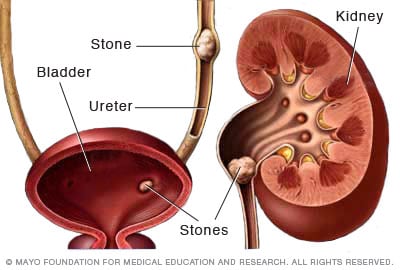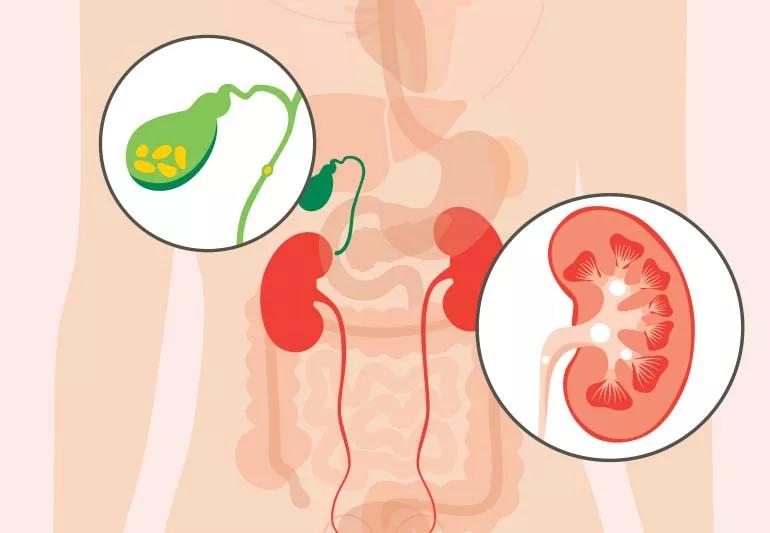Browsing the Signs of Kidney Stones vs UTI: A Detailed Contrast
Wiki Article
Discovering the Symptoms and Causes of Kidney Stones in Contrast to Urinary Tract Infections: A Thorough Guide
The expedition of kidney rocks and urinary system tract infections (UTIs) discloses a complex interplay of symptoms and underlying causes that call for mindful evaluation. While both problems can bring about hematuria, they present distinctive professional functions and develop from different etiological variables. Recognizing the nuances of each problem is important for reliable medical diagnosis and management. What are the essential distinctions in their symptoms, and exactly how might these notify treatment strategies? The responses to these concerns might give vital insights into the prevention and treatment of these typical urological concerns.Summary of Kidney Stones
Kidney stones, also called renal calculi, form when certain substances in the pee crystallize and accumulation, bring about the growth of tough down payments within the kidneys. These rocks can vary in size, ranging from a grain of sand to a golf ball, and can be made up of numerous products, one of the most typical being calcium oxalate, uric acid, struvite, and cystine. The formation of kidney stones is affected by a number of aspects, including dietary habits, liquid consumption, and hereditary tendency.Symptoms of kidney stones might consist of severe pain in the back or side, blood in the pee, queasiness, and regular urination, particularly as the rock moves through the urinary system system. Diagnosis generally involves imaging researches such as ultrasound or CT scans, together with urinalysis to identify the rock's structure.
Treatment alternatives vary based on the dimension and kind of stone, along with the extent of signs (Kidney Stones vs UTI). Small rocks may pass normally with raised fluid consumption, while larger rocks may need medical treatments such as lithotripsy or surgical elimination. Recognizing the pathophysiology and risk variables connected with kidney rocks is vital for effective avoidance and management
Introduction of Urinary Tract Infections
Urinary system system infections (UTIs) prevail microbial infections that affect any type of part of the urinary system, consisting of the kidneys, ureters, bladder, and urethra. They predominantly take place when germs, often from the intestinal system, get in the urinary system, resulting in swelling and infection. UTIs are categorized into 2 main types: straightforward and challenging. Uncomplicated UTIs usually happen in healthy and balanced individuals with typical urinary systems, while complicated UTIs may emerge in individuals with underlying conditions, such as architectural problems or endangered immune systems.The prevalence of UTIs is notably higher in women than guys, mainly because of physiological distinctions, such as a shorter urethra. Risk elements include sex, specific contraceptive techniques, urinary retention, and dehydration. The diagnosis of UTIs is normally verified with urine tests, which may reveal the presence of bacteria, white blood cells, or red blood cells.

Signs And Symptoms of Kidney Stones
The pain related to kidney stones can show up in numerous methods, typically leading individuals to seek clinical interest. One of one of the most typical signs is severe Related Site discomfort, normally localized in the lower back or side, which might radiate to the abdomen or groin. This discomfort, typically described as sharp or cramping, can take place instantly and may fluctuate in strength.Furthermore, people might experience hematuria, or blood in the urine, which can vary from microscopic total up to visible discoloration. This sign may be come with by modifications in urinary system routines, such as enhanced regularity or seriousness, along with discomfort throughout peeing. Nausea and throwing up are additionally prevalent, commonly arising from the body's reaction to intense discomfort.
In many cases, people might experience fever and cools, especially if an additional infection establishes because of the blockage brought on by the rocks. In general, the mix of extreme pain, hematuria, modified urinary system patterns, and gastrointestinal symptoms can supply substantial insight into the existence of kidney rocks, necessitating prompt medical examination and treatment. Recognizing these symptoms is important for prompt diagnosis and effective administration of the problem.
Signs And Symptoms of Urinary System System Infections
Infections within the urinary system system often present a series of unique signs that can substantially affect daily life. The most typical signs consist of a consistent desire to pee, commonly come click for info with by a burning sensation during peeing, known as dysuria. Individuals might also experience increased frequency of peeing, generating tiny amounts of urine each time.Various other significant signs consist of gloomy or fetid urine, which may show the visibility of bacteria or pus. In some cases, urine might show up red or pink as a result of the presence of blood, a problem recognized as hematuria. Additionally, individuals may experience pelvic discomfort or pressure, which can additionally exacerbate the sensation of urgency.
Systemic signs may also show up, such as high temperature, cools, and fatigue, specifically if the infection has risen to the kidneys. It is vital to acknowledge these signs early, as neglected urinary system infections can result in more extreme issues. Kidney Stones vs UTI. Motivate clinical attention is advised when these symptoms are observed, allowing for suitable analysis assessment and treatment to reduce discomfort and protect against more health and wellness problems
Reasons For Each Problem
Often, kidney stones and urinary system system infections arise from distinct yet occasionally overlapping reasons that can influence individuals differently. Kidney stones typically create due to metabolic aspects, dietary options, and hereditary predispositions. Enhanced levels of calcium, oxalate, or uric acid in the urine can cause rock formation. Dehydration, inadequate liquid intake, and high-sodium diet plans can worsen these problems, promoting formation within the urinary tract.
Understanding these distinct reasons is essential for prevention click site and treatment. Kidney Stones vs UTI. While lifestyle modifications may mitigate the danger of kidney stones, proper hygiene and timely treatment of urinary system infections are necessary for minimizing their reoccurrence and associated difficulties
Verdict
In recap, kidney rocks and urinary system tract infections present distinct symptoms and underlying reasons. Kidney stones are identified by serious pain and metabolic factors, while urinary system tract infections primarily entail bacterial infections resulting in urinary seriousness and pain. Both problems can result in hematuria, their formation mechanisms vary significantly. Understanding these distinctions is important for reliable diagnosis and therapy, eventually improving person results for those affected by either problem.The exploration of kidney rocks and urinary system infections (UTIs) reveals a complicated interaction of symptoms and underlying causes that necessitate careful exam.Urinary system system infections (UTIs) are usual microbial infections that affect any part of the urinary system, including the kidneys, ureters, bladder, and urethra.Often, kidney rocks and urinary system tract infections arise from unique yet often overlapping causes that can impact people differently.In summary, kidney stones and urinary tract infections existing distinct signs and underlying reasons. Kidney stones are identified by severe discomfort and metabolic elements, while urinary system system infections mainly involve microbial infections leading to urinary system seriousness and pain.
Report this wiki page